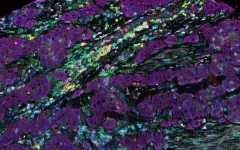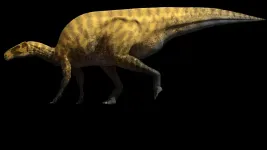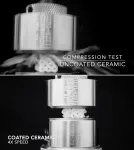Faulty memories of our past whereabouts: The fallacy of an airtight alibi
2021-07-07
(Press-News.org) When someone is suspected of criminal activity, one of the most important questions they are asked is if they have a credible alibi. Playing back past events in our minds, however, is not like playing back a video recording. Recollections of locations, dates, and companions can become muddled with the passage of time. If a suspect's memories are out of line with documented events, a once-plausible alibi can crumble and may be seen as evidence of guilt.
To put people's memories of past whereabouts to the test, a team of researchers tracked the locations of 51 volunteers for one month and found that their recollections were wrong approximately 36% of the time.
"This is the first study to examine memory for where an event happened," said Simon J. Dennis, director of the Complex Human Data Hub at the University of Melbourne's School of Psychological Sciences and lead author of the study, which was published in the journal Psychological Science. "We were able to use experience-sampling methods to actually examine people's memories and analyze what is affecting memory error in their everyday life."
In the study, an app on the participants' smartphones continuously (and securely) recorded their locations and surroundings via GPS. The app also made sound recordings of the environment every 10 minutes. Participants had the freedom to turn off the app or to delete events--a mechanism designed to protect privacy.
At the end of the month, the participants received a memory test in which they were given a time and date and then asked to select one of four markers on Google Maps to show where they had been at that moment.
The results revealed that participants tended to confuse days across weeks. They also often confused weeks in general and hours across days. The participants had the poorest recall when memories of one event become entwined with memories of a similar experience, such as filling up a car with gas at a different location of the same gas-station chain.
Additionally, the researchers found that people tended to confuse places they had visited at similar times or locations, such as multiple bars visited in one evening. People also made mistakes--although less frequently--when events involved similar sounds or movement patterns, such as when they had walked through town on different days while listening to their favorite music.
"This has implications for alibi generation, as jurors tend to assume that a suspect who is wrong is lying," said Dennis. "These results can alert investigators to the questions they should ask in order to catch the memory errors that suspects are likely to make."
INFORMATION:
Reference: Laliberete, E., Yim, H., Stone, B., & Dennis, S. (2021). The fallacy of an airtight alibi: Understanding human memory for "where" using experience sampling. Psychological Science, 23(6), 944-951https://doi.org/10.1177/0956797620980752
Additional research can be found in the APS Research Topic on Memory.
ELSE PRESS RELEASES FROM THIS DATE:
2021-07-07
Uppsala University scientists have designed a new mouse model that facilitates study of factors contributing to the progression of human bladder cancer and of immune-system activation when the tumour is growing. Using this model, they have been able to study how proteins change before, while and after a tumour develops in the bladder wall. The study has now been published in the scientific journal PLOS ONE.
"The model was designed both to contain specific oncogenes, as they're called -- mutations that can drive tumour growth -- and to show a high incidence of harmful mutations, which we often see in people who get bladder cancer. These harmful mutations arise because of smoking, for instance, which is ...
2021-07-07
Sudanese Islamic burial sites are distributed according to large-scale environmental factors and small-scale social factors, creating a galaxy-like distribution pattern, according to a study published July 7, 2021 in the open-access journal PLOS ONE by Stefano Costanzo of the University of Naples "L'Orientale" in Italy and colleagues.
The Kassala region of eastern Sudan is home to a vast array of funerary monuments, from the Islamic tombs of modern Beja people to ancient burial mounds thousands of years old. Archaeologists don't expect these monuments are randomly placed; their ...
2021-07-07
GPS data from cell phones may provide insight into how city inhabitants are using their urban greenspaces, in a study published July 7, 2021 in the open-access journal PLOS ONE by Meghann Mears and Paul Brindley from the University of Sheffield, UK, and colleagues.
Urban greenspaces confer a range of health and well-being benefits on city inhabitants and provide connection to nature. In this study, Mears and colleagues use cellphone GPS data to assess how frequently residents of the city of Sheffield in the UK engage with their local urban greenspaces, and whether this engagement was different across demographic groups.
The authors used the "Shmapped" app, developed as part of the Improving Well-being through Urban Nature project, to track how frequently 240 users based in Sheffield ...
2021-07-07
New iguanodon-like dinosaur identified from jawbone fossil from Spain was likely a 6-8m long herbivore, closely related to species found in modern-day China and Niger.
INFORMATION:
Article Title: A new Styracosternan hadrosauroid (Dinosauria: Ornithischia) from the Early Cretaceous of Portell, Spain
Funding: The authors received no specific funding for this work.
Competing Interests: The authors have declared that no competing interests exist.
Article URL: https://journals.plos.org/plosone/article?id=10.1371/journal.pone.0253599
...
2021-07-07
Brain microstructure may help explain the benefits of physical activity on cognition in older adults, according to MRI scans of 318 brains post-mortem.
INFORMATION:
Article Title: Physical activity, brain tissue microstructure, and cognition in older adults
Funding: This work was supported in part by the National Institute on Aging (https://www.nia.nih.gov) grants K25 AG61254 (RJD), K01 AG64044 (VNP), K01 AG50823 (BDJ), R01 AG17917 (DAB), R01 AG47976 (ASB), R01 AG56352 (ASB), R01 AG64233 (JAS, KA), and P30 AG10161 (DAB), the National Institute of Neurological Disorders and Stroke (https://www.ninds.nih.gov) grant UH3 NS100599 ...
2021-07-07
HOUSTON - (July 7, 2021) - A thin shell of soft polymer can help keep knotty ceramic structures from shattering, according to materials scientists at Rice University.
Ceramics made with 3D printers crack under stress like any plate or bowl. But covered in a soft polymer cured under ultraviolet light, the same materials stand a far better chance of keeping their structural integrity, much like a car windshield's treated glass is less likely to shatter.
The research at Rice's Brown School of Engineering, which appears in Science Advances, demonstrates the concept on schwarzites, complex lattices that for decades existed only as theory but can now be made with 3D printers. With added polymers, they come to resemble structures ...
2021-07-07
Microscopists have long sought to find a way to produce high-quality, deep-tissue imaging of living subjects in a timely fashion. Until now, they had to choose between image quality or speed when it comes to looking into the inner workings of complex biological systems.
Such a development would have a powerful impact on researchers in biology and in neuroscience, experts say. Now Dushan N. Wadduwage, a John Harvard Distinguished Science Fellow in Imaging at the FAS Center of Advanced Imaging, along with a team from MIT, detailed a new technique that would make that possible in a report in Science Advances.
In the paper, the team presents a new process that uses computational imaging to get high resolution images at a rate 100 to 1,000 times faster than other state-of-the-art ...
2021-07-07
Increased acidity in the atmosphere is disrupting the ecological balance of the oceans, according to new research led by the University of East Anglia (UEA).
The first study to look at acidity's impact on nutrient transport to the ocean demonstrates that the way nutrients are delivered affects the productivity of the ocean and its ability to absorb CO2 from the atmosphere.
The research, 'Changing atmospheric acidity as a modulator of nutrient deposition and ocean biogeochemistry', is published today in Science Advances. The analysis was carried out by an international team of experts, sponsored by the United Nations Group of Experts on the Scientific Aspects of Marine Environmental Protection (GESAMP).
Prof Alex Baker, professor of marine and atmospheric chemistry ...
2021-07-07
To create high-resolution, 3D images of tissues such as the brain, researchers often use two-photon microscopy, which involves aiming a high-intensity laser at the specimen to induce fluorescence excitation. However, scanning deep within the brain can be difficult because light scatters off of tissues as it goes deeper, making images blurry.
Two-photon imaging is also time-consuming, as it usually requires scanning individual pixels one at a time. A team of MIT and Harvard University researchers has now developed a modified version of two-photon imaging that can image deeper within tissue and perform the imaging much more quickly than what was previously possible.
This kind of imaging could allow scientists to more rapidly obtain ...
2021-07-07
Metastatic tumors originating from notoriously aggressive triple-negative breast cancer that emerge in the lungs contain a more diverse array of cancer cells than those that arise in the liver, according to a new study in mice and organs from deceased cancer patients. The study also identified a set of genes that distinguish lung and liver metastases; together, the findings may inform future research on how targeted therapies impact tumors across various microenvironments. While scientists have known that the presence of distinct tumor cell populations within the same tumor drives breast cancer progression, it has not been fully understood why this dangerous cellular diversity develops within some tumors and not others. To investigate ...
LAST 30 PRESS RELEASES:
[Press-News.org] Faulty memories of our past whereabouts: The fallacy of an airtight alibi




